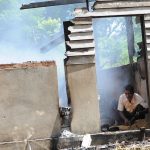This post originally appeared in the Asia Times
Historic temples. Sandy beaches. Fishing grounds and farmland galore.
This is the idyllic and profitable picture that the government of Myanmar painted last week for potential investors in the country’s troubled Rakhine state. The government sought to allure crowds of potential investors from countries including Japan and South Korea who attended the Rakhine State Investment Fair in the town of Thandwe, with descriptions of Rakhine’s “untapped” investment potential.
What those potential investors didn’t hear was any mention of Rakhine’s Muslim Rohingya ethnic minority population. Or the brutal spree of state-backed violence targeted at Rakhine’s Rohingya population in August 2017 that killed thousands and prompted 720,000 Rohingya to flee to Bangladesh, where they remain to this day.
That omission was no mistake. According to Aung Naing Oo, director general of Myanmar’s Directorate of Investment and Company Administration, the failure to mention the humanitarian catastrophe inflicted on the Rohingya in Rakhine and the Myanmar government’s singular failure to take any meaningful steps toward accountability for those outrages reflect the government’s position that “investment is not political.”
Elsewhere at the fair, Myanmar’s minister for investment and foreign economic relations, Thaung Tun, sought to negate decades of well-documented systematic abuses against the country’s ethnic minorities by touting ethnic diversity as Myanmar’s “great potential” for investors.
That cravenly self-serving government propaganda is as sinister as it is dishonest. And it reflects the role of the Rakhine State Investment Fair as part of a wider government campaign to attempt to paper over the monstrous crimes perpetrated in Rakhine with a veneer of business-as-usual normalcy.
The Myanmar government’s apparent gambit is that if it turns a deaf ear long enough to the international opprobrium about the slaughter of the Rohingya and the humanitarian crisis of the refugee camps in neighboring Bangladesh, foreign investor interest in Rakhine’s oil and gas, agriculture, and fishing sectors will inevitably help mute the calls for accountability.
The Myanmar government’s apparent gambit is that if it turns a deaf ear long enough to the international opprobrium about the slaughter of the Rohingya and the humanitarian crisis of the refugee camps in neighboring Bangladesh, foreign investor interest in Rakhine’s oil and gas, agriculture, and fishing sectors will inevitably help mute the calls for accountability.
Indeed, while Myanmar has rolled out the red carpet for foreign investors to Rakhine, it has forbidden international organizations seeking to investigate the slaughter of 2017 from accessing the area. Most notably, the government has blocked UN Special Rapporteur to Myanmar Yanghee Lee, who is tasked with assessing the human-rights situation in Myanmar.
In 2017, the government placed restrictions on an official fact-finding mission led by Lee that she described as an “affront to the independence of my mandate as Special Rapporteur.” That December, it announced it was denying her access to the country, including to Rakhine state.
In June last year, the government announced the creation of an “independent commission of inquiry” to investigate further allegations of human-rights abuses in Rakhine state. Given Myanmar’s limited past efforts on justice and accountability, there are reasonable grounds for concern about whether these investigations will be carried out effectively or in accordance with credible international standards.
Those efforts dovetail with moves by the Myanmar government and security forces to erase the sites of mass slaughter of Rohingya in Rakhine. Over the past two years, satellite images have revealed that the locations of former Rohingya villages in Rakhine have been “flattened and scraped by bulldozers.” In what appears to be a blatant form of post-conflict elimination of physical remnants left behind by the dead or fled Rohingya, those villages have been replaced by facilities for the security forces as well as hundreds of new homes built for mostly Buddhist residents from other areas of Rakhine.
Potential foreign investors who attended the Rakhine State Investment Fair should be under no illusions about the grim recent history of Rakhine state and the horrors that the Myanmar military inflicted on its Rohingya population. UN-appointed investigators concluded last August that Myanmar’s state-backed violence against the Rohingya constituted the “gravest” crimes against civilians under international law, including genocide.
Investigations by Physicians for Human Rights over the past two years put a tragic human face to that UN assessment and provide scientific objectivity in refuting the government’s repeated denials. In 2018, PHR surveyed leaders from 604 Rohingya hamlets in Rakhine state encompassing more than 916,000 people. The findings, coupled with in-depth interviews and forensic medical examinations of Rohingya survivors, point to a widespread and systematic pattern of targeted violence – including rapes and killings of women, men and children.
The Rakhine State Investment Fair reflects the Myanmar government’s desperation to change the narrative of its security forces’ well-documented role in the targeted killings of the Rohingya and their harrowing journey to safety in Bangladesh. It is a cynical official attempt to parry international demands for accountability with the prospect of financial profit.
Foreign governments and foreign investors alike should dismiss such craven cover-up efforts by the Myanmar government and make clear that normal diplomatic and economic relations hinge on respecting human rights and ensuring accountability in Rakhine, not undermining it.

